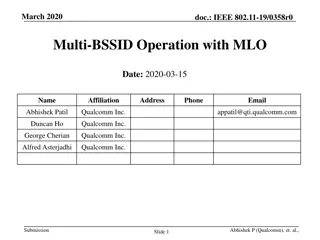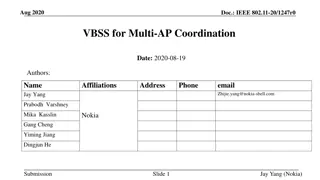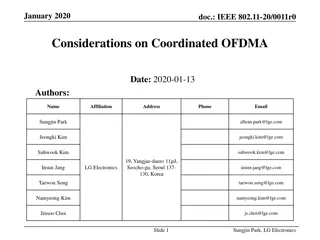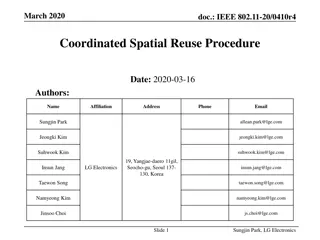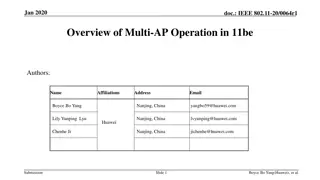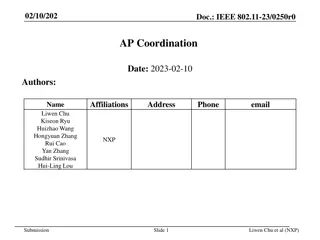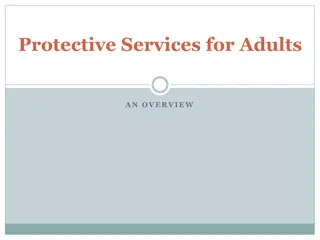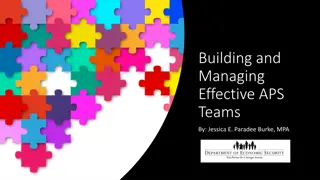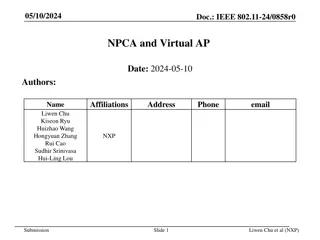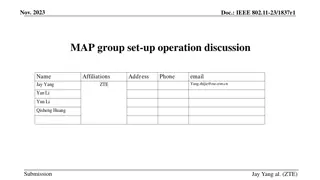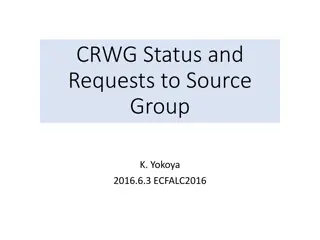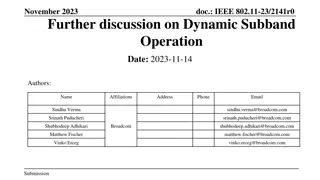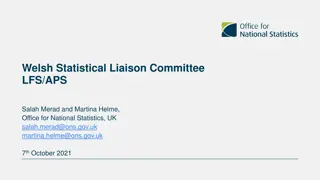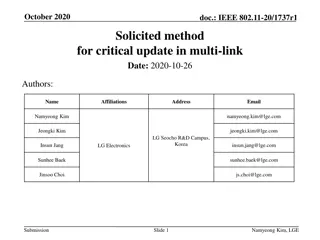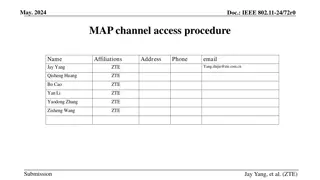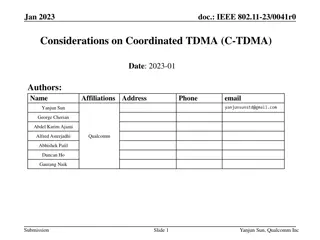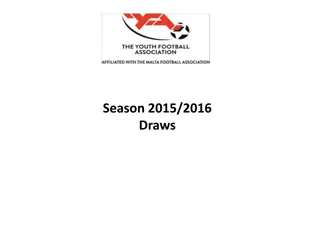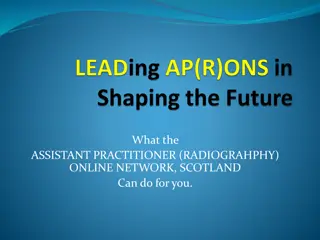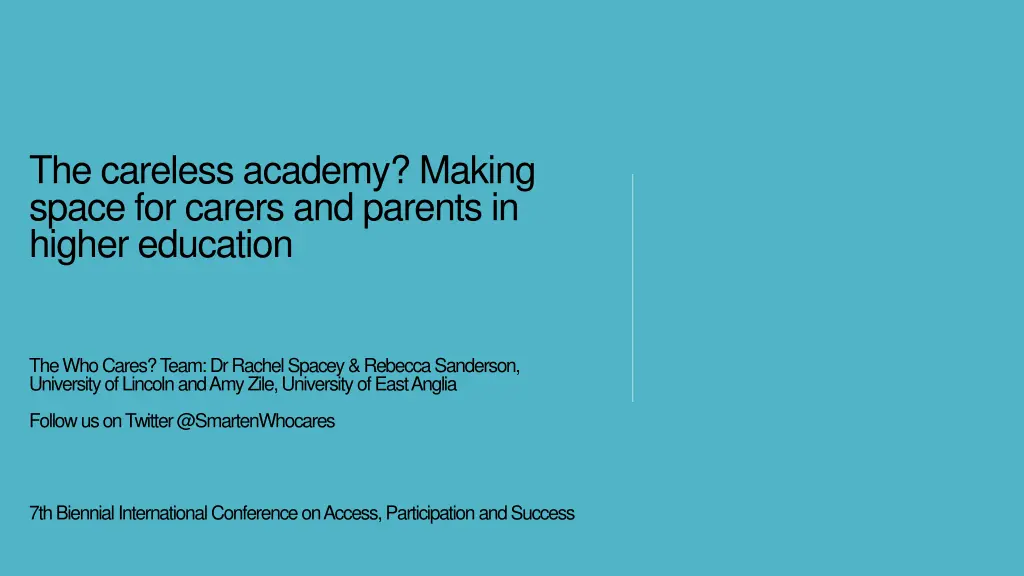
Making Space for Carers and Parents in Higher Education - Who Cares?
Join Dr. Rachel Spacey, Rebecca Sanderson, and Amy Zile as they discuss the challenges, strengths, and recommendations for student carers and parents in higher education. Learn about the Who Cares? Study and the impact of care responsibilities on students' academic lives.
Download Presentation

Please find below an Image/Link to download the presentation.
The content on the website is provided AS IS for your information and personal use only. It may not be sold, licensed, or shared on other websites without obtaining consent from the author. If you encounter any issues during the download, it is possible that the publisher has removed the file from their server.
You are allowed to download the files provided on this website for personal or commercial use, subject to the condition that they are used lawfully. All files are the property of their respective owners.
The content on the website is provided AS IS for your information and personal use only. It may not be sold, licensed, or shared on other websites without obtaining consent from the author.
E N D
Presentation Transcript
The careless academy? Making space for carers and parents in higher education The Who Cares? Team: Dr Rachel Spacey & RebeccaSanderson, University of Lincoln and Amy Zile, University of East Anglia Follow us on Twitter@SmartenWhocares 7th Biennial International Conference on Access, Participation and Success
Presentation What do we mean by care? Students with Caring Responsibilities (SCRs) Care in a university context: what do we know? Care-less institutions? The Who Cares? Study Challenges and tensions for SCRs Strengths and attributes of SCRs Conclusions Recommendations References
An emotionally invested, responsive activity to meet the personal needs of those who are dependent (Oliker, 2011, 968) What do we mean by care? Student carers are responsible for providing unpaid care for a partner, friend or family member who needs support due to illness, disability, a mental health problem or an addiction and cannot cope without their help (NHS England, nd) Student parents have responsibility for caring for a biological or adoptive child, or for fostering a child on a long- or short-term basis Sandwich or multigenerational carers do both.
Students with Caring Responsibilities (SCRs) - Undergraduate, postgraduate taught or postgraduate research student of any age, nationality,gender, ethnicity, or religion who: - Cares for a child or children as a biological or adoptive parent or foster carer, and/or Cares for, or helps to care for, an adult or child (for example a friend, sibling, parent or grandparent) who needs help because of their illness, frailty, disability, a mental health problem or an addiction and cannot cope without their support. This care is unpaid, and/or - Supports emotionally or through advocacy to social and/or medical services, an adult or child (for example, a friend, sibling, parent or grandparent) who needs help because of their illness, frailty, disability, a mental health problem or an addiction and cannot cope without their support. This care is unpaid. -
Limited data makes the number of SCRs and the impact of care/study conflict hard to ascertain Care in a university context: what do we know? But we do know that SCRs face significant disadvantage in HE SCRs may feel unable to spend sufficient time on their studies and have limited or no leisure time (Day, 2019) SCRs may find it more difficult to take part in academic and social activities on campus (Dent, 2020; Scott and Varner, 2020) Issues with timetabling, financial pressure and feelings of inadequacy have also been associated with the experience of being an SCR (Marandet and Wainwright, 2010; Moreau and Kerner, 2015) Care-giving has also been associated with negative outcomes in relation to physical and mental health (ONS, 2013).
Lynch (2010) described HE culture and practices as careless, creating baked-in inequalities Greedy institutions (Coser, 1974) make excessive demands on our time, exerting subtle pressure to freeze out other commitments (Sullivan, 2013, 3) Care-less institutions? Moreau and Kerner (2015) have characterised universities and families as greedy institutions that can leave students and staff who having caring responsibilities feeling torn, guilty and inadequate.
The Who Cares? study Our response to SMaRteN key questions funding call: study- work-life balance for SCRs Develop the evidence base about SCR wellbeing and student experience Improve understanding of the university journey and the challenges of achieving study-work-life balance Identify practical ways for universities to become care- inclusive.
The Who Cares? approach and methods Participatory action research philosophy Mixed methods explanatory sequential design Data collection: survey and interviews - Survey: measures include the Warwick Edinburgh Mental Wellbeing Scale; the work/nonwork interference and enhancement scale (Fisher et al., 2009) and the Psychological Sense of School Membership scale (adapted) (Goodenow et al., 1993) - Interviews : structured online interviews with SCRs Oversight by steering group composed of SCRs, practitioners. professionals and academics.
Challenges and tensions for SCRs: wellbeing General levels of wellbeing were low Students providing emotional care and end of life care were particularly vulnerable to lower levels of wellbeing Wellbeing levels negatively impacted social and extra- curricular opportunities Survey participants struggled to engage with self- care, course content and social and extra-curricular activities.
Josh's Story Josh is an undergraduate student at a post-1992 university He has cared for his mum for many years but was never formally registered as a young carer by his school/ local authority Josh found university processes put him under pressure I've found challenges at the university with assignments last year they threw one on us quite last minute. I'm trying to get through to them the fact that you can't throw something at us to be done in the next 48 hours, because I had things planned at that time. I was working and I had caring responsibilities and it was quite difficult to get that through to them.
Joshs Story Frustrated by the lack of awareness of and support for young carers offered by his university and by the local authority I actually challenged [the lecturer] and said, Show me your carers policy and he said, We don't have one . Josh wanted to see greater awareness of the demands of being an unpaid carer Paid carers they get to go home at the end of the day, we don t, it's our lives but nobody seems to realise that. Josh is now an activist and advocate for carers in education.
Strengths and attributes of SCRs - are numerous and varied!
Care is a normal human activity, but in Higher Education (and other) contexts it can be perceived as problematic Universities contribute to the challenges SCRs face in numerous ways, creating structural disadvantage Conclusions These challenges undermine the mental health and wellbeing of SCRs Pockets of good practice highlight that carer- inclusive HE is possible.
Recommendations Make care visible - for staff and students Care capital - ensure the strengths and skills SCRs bring such as time management, prioritisation, perspective, skills and confidence are recognised and incorporated in teaching, learning and student support practices Financial support for SCRs - reduces paid work requirements Communicate that institutional financial support and keep communicating it (and any other support on offer!) Recognise potential gaps - lone carers/parents, lack of other/wider family support, limited access to paid care, economic insecurity. What can be done to fill or reduce them?
References Day, C. (2019) An empirical case study of young adult carers engagement and success in higher education. International Journal of Inclusive Education, 25(14), 1597-1615. Dent, S. (2021) Recognising students who care for children while studying. Bingley: Emerald Publishing Limited. Coser, L. (1974) Greedy Institutions: Patterns of undivided commitment. New York: The Free Press. Fisher, G. G., Bulger, C. A. and Smith, C. S. (2009) Beyond work and family: A measure of work/nonwork interference and enhancement. Journal of Occupational Health Psychology, 14(4), 441 456. https://doi.org/10.1037/a0016737 Goodenow C. (1993) The psychological sense of school membership among adolescents: Scale development and educational correlates. Psychology in the Schools, 30, 79-90. Lynch, K. (2010) Carelessness: A hidden doxa of higher education. Arts and Humanities in Higher Education, 9(1), 54 67. https://doi.org/10.1177/1474022209350104 Marandet, E. and Wainwright, E. (2010) Invisible experiences: understanding the choices and needs of university students with dependent children. British Educational Research Journal, 36(5), 787-805.
References continued Moreau, M. P. and Kerner, C. (2015) Care in academia: an exploration of student parents experiences. British Journal of Sociology of Education, 36(2), 215-233 . NHS England (nd) Who is considered a carer? https://www.england.nhs.uk/commissioning/comm-carers/carers/ Office for National Statistics (2013) Full story: The gender gap in unpaid care provision: is there an impact on health and economic position? https://www.ons.gov.uk/peoplepopulationandcommunity/healthandsocialcare/healthandwellbeing/articles/fullstorytheg endergapinunpaidcareprovisionisthereanimpactonhealthandeconomicposition/2013-05-16 Oliker, S. (2011) Sociology and Studies of Gender, Caregiving, and Inequality. Sociology Compass, 5, 968- 983. https://doi.org/10.1111/j.1751-9020.2011.00417.x Scott, R. and Varner, B. (2020) Exploring the Research and Library Needs of Student-Parents. College & Research Libraries, 81(4), 598. https://doi.org/10.5860/crl.81.4.598 Sullivan, T.A. (2014) Greedy Institutions, Overwork, and Work-Life Balance. Sociol Inq, 84, 1- 15. https://doi.org/10.1111/soin.12029

